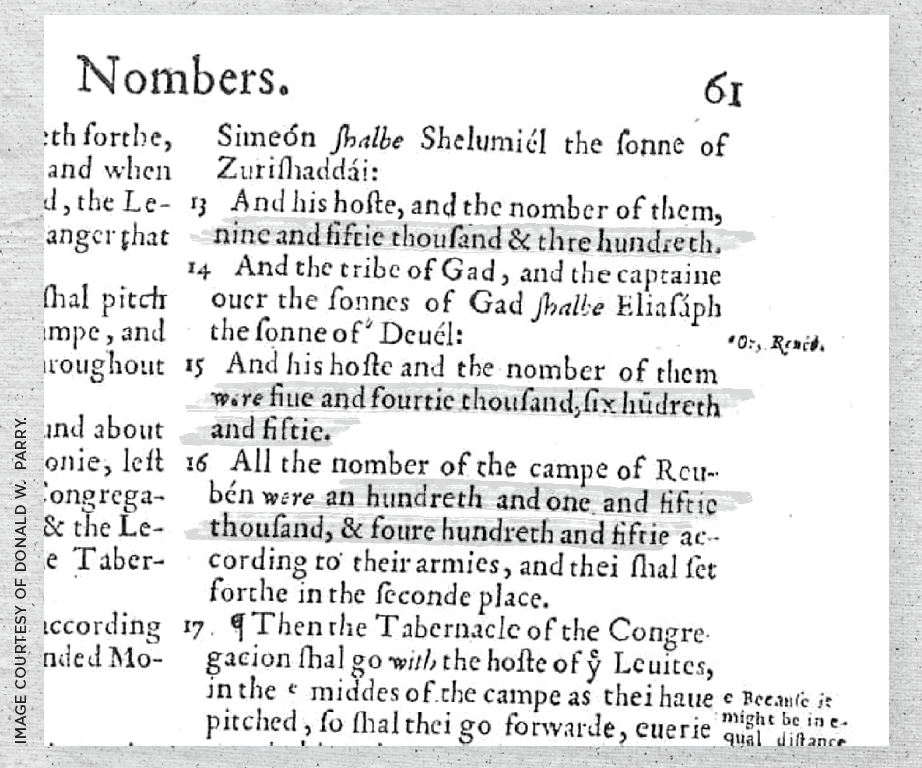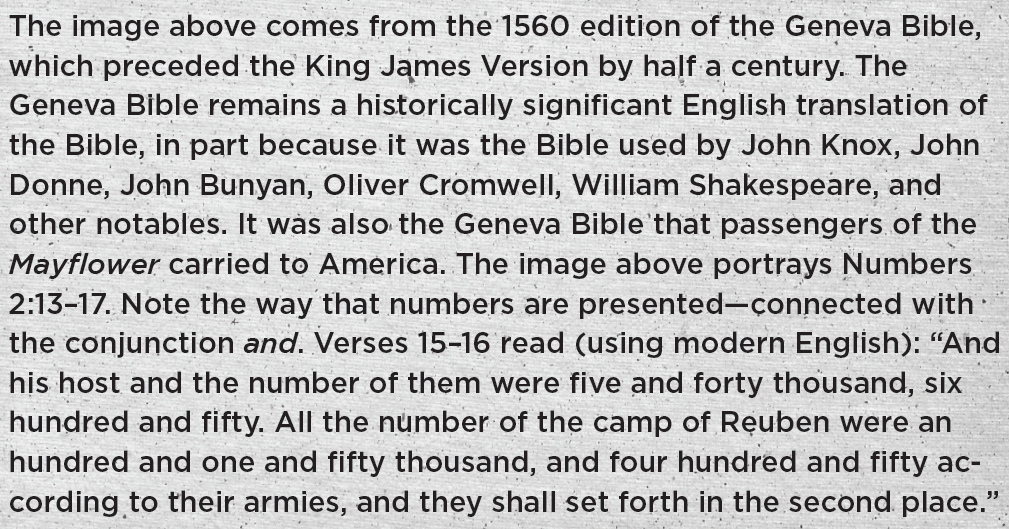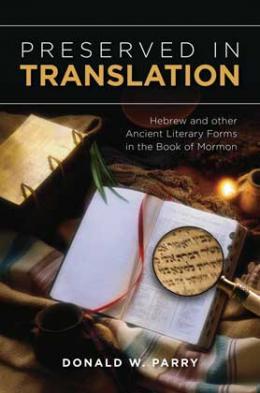Number Parallelism
Donald W. Perry, “Number Parallelism,” in Preserved in Translation: Hebrew and Other Ancient Literary Forms in the Book of Mormon (Provo, UT: Religious Studies Center, Brigham Young University; Salt Lake City: Deseret Book), 35‒38.
"thousands and tens of thousands" (Alma 3:26)
Biblical poets used numbers rhetorically in various ways.[1] One is a form of parallelism in which the numbers are presented in two lines, with the second line increasing the first number by one.[2] This exaggerated comparison heightens the sense of multitude,[3] lending greater importance to the thing being described.
There are three things that are never satisfied,
yea, four things say not, It is enough. (Proverbs 30:15)
He shall deliver thee in six troubles:
yea, in seven there shall no evil touch thee. (Job 5:19)
A variation of that pattern multiplies the first number manyfold:
A thousand shall fall at thy side,
and ten thousand at thy right hand. (Psalm 91:7)
If Cain shall be avenged sevenfold,
truly Lamech seventy and sevenfold. (Genesis 4:24)
A final Old Testament example combines both patterns, going from one to two and from one thousand to ten thousand:
How should one chase a thousand,
and two put ten thousand to flight . . .? (Deuteronomy 32:30)
The Book of Mormon writers did not use numerical parallelism as often as their Old Testament counterparts did. This difference might be attributed to different writing styles, but more likely it is because the Old Testament contains large sections of poetry, such as the books of Psalms, Proverbs, and Ecclesiastes. Nevertheless, there are a few instances of numbers used rhetorically in the Book of Mormon:
And in one year were thousands
and tens of thousands of souls sent to the eternal world. (Alma 3:26)
Will ye sit in idleness while ye are surrounded with thousands of those,
yea, and tens of thousands, who do also sit in idleness . . .? (Alma 60:22; see 3 Nephi 4:21)
The number in the first line of both examples is “thousands,” but the subsequent use of “tens of thousands” in both examples effectively magnifies the point.


Book of Mormon Echoes of Biblical Hebrew: Numbers without a Noun
In Biblical Hebrew a number might be given without an accompanying noun. For instance, Genesis 45:22 states that Joseph “gave three hundred of silver” to Benjamin. For clarity the King James translators supplied the word pieces, distinguished by smaller type in a different font (later italicized) to show it was not part of the original text. Other biblical examples are “ten shekels weight of gold” (Genesis 24:22) and “he measured six measures of barley” (Ruth 3:15).
In the Book of Mormon, Laban is described as a “mighty man” who can “command fifty, yea, even he can slay fifty” (1 Nephi 3:31). Do the two instances of fifty refer to men, warriors, princes, or commanders of armies? We can guess, but the translation does not specify. The verbs command and slay in the parallelism heighten the principal idea that further dealings with Laban will put Lehi’s sons in jeopardy of their lives. One mighty enough to slay fifty is certainly more powerful and dangerous than one who can command fifty.
Other Book of Mormon examples that follow the Hebrew pattern of omitting nouns in expressions involving numbers include “by the words of three, God hath said, I will establish my word” (2 Nephi 11:3); “my little band of two thousand and sixty fought most desperately” (Alma 57:19); and “it came to pass that there were two hundred, out of my two thousand and sixty” (Alma 57:25).
Notes
[1] Examples in biblical poetry and prophecy are Proverbs 30:18–19, 20–23, 29–31 and Amos 1:3, 6, 9, 11, 13. For a brief introduction to the use of numbers in parallelisms, see Parry, Poetic Parallelisms in the Book of Mormon, xv.
[2] Wolfgang M. W. Roth has examined some thirty-one examples of number parallelism in the Old Testament. See Roth, “Numerical Sequence x/
[3] See Parry, “Hebrew Literary Patterns in the Book of Mormon,” 60.
